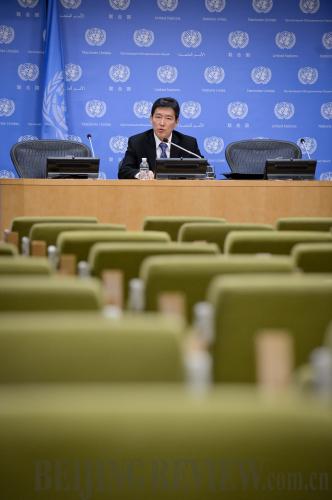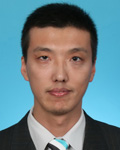|
 |
|
ISOLATED EMISSARY: North Korean Deputy Ambassador to the UN, Ri Tong Il, accuses the United States of intensifying tensions on the Korean Peninsula during a news briefing at the UN headquarters in New York on April 4 (NIU XIAOLEI) |

In late August, the Democratic People's Republic of Korea (DPRK), also known as North Korea, informed the United Nations that its Foreign Minister Lee Yong Soo would attend the 69th Session of the UN General Assembly that will open in New York in late September. It has been 15 years since Pyongyang's top diplomat attended a UN General Assembly.
The unconventional arrangement is the latest in a string of subtle yet noteworthy moves recently taken by North Korea to improve its relationship with the United States.
It has been confirmed that a U.S. work team consisting of CIA and White House officials paid a secret visit to North Korea in August. During their 18-hour stay, U.S. officials spoke with North Korean authorities regarding U.S. citizen Kenneth Bae, who has been detained in North Korea since November 2012 on charges of "hostile acts against the DPRK Government."
Hostage diplomacy
Apart from Bae, two additional U.S. citizens—Mathew Miller and Jeffrey Fowle—are in the hands of North Korean authorities. On September 1, the U.S. National Security Council and U.S. Department of State expressed concerns about the three U.S. citizens detained in North Korea and urged their release in separate statements. On the second day, CNN broadcasted the video of an interview with the three detainees. CNN said that its reporters went to the country to cover cultural events at the invitation of North Korea, and the interview came as a sudden arrangement by North Korean authorities without advance notice.
In the interview, the three detained Americans called upon the U.S. Government to send a special envoy to visit North Korea and secure their release as soon as possible. U.S. press believes DPRK authorities are using the hostages as bargaining chips to establish direct contact with President Barack Obama's administration, suggesting North Korea's willingness to engage with the international community.
North Korea's diplomatic signals have posed a challenge for the Obama administration, which has been criticized domestically for its perceived weakness in foreign policy. In light of this, Washington is unlikely to beg Pyongyang for the pardoning of the American detainees, let alone soften its tough policy stance.
However, the Obama administration might not want to miss out on the chance to rescue the U.S. citizens held in North Korea. It needs to make some diplomatic achievements to boost U.S. morale at a time of internal and external predicaments.
North Korea likely has three figures in mind for a U.S. special envoy: former U.S. President Bill Clinton, former U.S. President Jimmy Carter and former governor of New Mexico Bill Richardson. These three U.S. politicians played a special role in promoting a U.S.-North Korea relationship and all of them had visited North Korea for humanitarian purposes.
| 